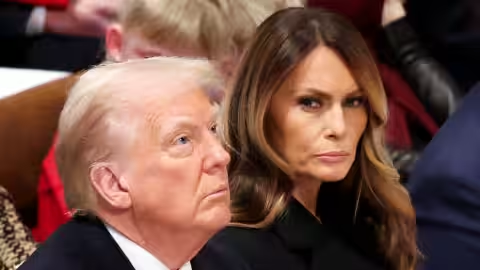In an urgent warning to the Trump administration, a prominent car parts manufacturer has highlighted the potential negative impacts of President Donald Trump’s tariffs on Mexican imports. The company, which operates within the automotive sector, cautioned that the proposed tariffs—intended to reduce the U.S. trade deficit and boost domestic manufacturing—could lead to significant disruptions in the supply chain, particularly in the automotive industry. Instead of bringing jobs back to the U.S. as envisioned by Trump’s “America First” trade policy, these tariffs could instead incentivize manufacturers to relocate their operations to lower-cost markets in Asia.
The car parts maker’s warning revolves around the complexities of global supply chains, which have become more interconnected and interdependent in recent years. The company, like many in the automotive industry, relies heavily on a network of suppliers in Mexico, where manufacturing costs are considerably lower than in the U.S. Tariffs on Mexican imports—especially on automotive parts—would increase the cost of these components and disrupt the flow of goods across borders, making it less viable for companies to continue sourcing products from Mexico.
The car parts manufacturer argues that, rather than reviving American manufacturing jobs, the tariffs would likely push companies to seek alternative, lower-cost production sites elsewhere, primarily in Asia. Countries such as China, Vietnam, and South Korea have long been attractive destinations for manufacturers seeking affordable labor and minimal trade barriers. By moving production to Asia, manufacturers could continue to benefit from low labor costs and streamlined logistics, which are difficult to replicate within the United States, especially with the added costs of Trump’s tariffs on imports from Mexico.
For the U.S. economy, this shift could have far-reaching and potentially harmful consequences. The intended goal of Trump’s tariffs was to revive domestic manufacturing and reduce the trade deficit by encouraging American companies to bring production back to the U.S. However, if these companies instead relocate to Asia, it could result in a loss of valuable manufacturing jobs, erode domestic supply chains, and ultimately undermine the broader goal of economic revitalization. The shift to Asia could also have implications for global trade, exacerbating tensions with China and other countries in the region.
Industry analysts have warned that such a move would further deepen the reliance of U.S. manufacturers on overseas production, which could undermine any progress made toward bringing more jobs back to American shores. Moving production to Asia would likely further entrench the very global supply chains that Trump’s tariffs are designed to challenge. Instead of reducing America’s dependency on foreign production, the tariffs could accelerate the offshoring of jobs and production facilities, ultimately making the U.S. more reliant on Asian manufacturers for key goods.
One of the primary concerns voiced by industry leaders is the potential for higher consumer prices. With manufacturing costs increasing due to tariffs, companies may be forced to pass those costs on to consumers in the form of higher prices for vehicles and car parts. This would be counterproductive for American consumers, many of whom are already burdened by rising costs of living. A surge in car prices could dampen consumer demand, particularly in the automotive sector, which has long been a driver of American economic growth.
The situation underscores the complexity of trade policy in a globalized economy. Experts argue that the Trump administration’s simplistic view of tariffs as a tool to reduce the trade deficit and bring jobs back to the U.S. ignores the nuances of global supply chains and the economic interdependencies that exist across borders. While some sectors may benefit from tariff protection, others, particularly those in industries with complex supply chains like the automotive sector, could face higher costs and reduced profitability.
In the case of the car parts maker, the choice between absorbing the cost of tariffs, shifting production to Asia, or passing the cost onto consumers presents a difficult dilemma. In all likelihood, manufacturers will explore the most cost-effective way to maintain their profit margins, and for many, that could mean moving operations overseas. The company’s warning serves as a stark reminder that trade policy is not a one-size-fits-all solution and that the unintended consequences of tariffs can have serious ramifications for industries that rely on cross-border production.
The warning from the car parts manufacturer comes as tensions between the U.S. and Mexico continue to mount. Trump has repeatedly threatened to impose tariffs on Mexican goods, citing concerns about illegal immigration and the trade imbalance between the two countries. While his administration has argued that these measures are necessary to address unfair trade practices, critics have pointed to the potential harm they could inflict on American businesses and consumers.
The administration’s approach to trade has drawn mixed reactions from business leaders. While some manufacturers have supported the tariffs as a way to secure better trade deals and reduce competition from lower-cost countries, others have warned that the policy could harm their ability to remain competitive on the global stage. The car parts maker’s cautionary statement is a reflection of these concerns and highlights the broader uncertainty that businesses face as they navigate the changing landscape of U.S. trade policy.
As negotiations over tariffs and trade agreements continue, it remains to be seen whether the Trump administration will adjust its policies in response to such warnings. However, it is clear that the impact of tariffs on the automotive industry and other sectors will continue to be a source of debate in the years to come.
For the latest updates on U.S. trade policies, manufacturing trends, and the global economy, stay informed with exclusive news and expert insights at www.innovationtimes.com. Sign up today to receive in-depth coverage of the issues shaping the future of business and technology.



